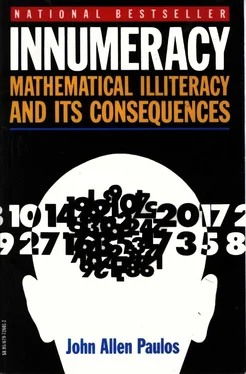For readers unwilling to accept this on faith, here is a brief derivation. By the multiplication principle, the number of ways in which five dates can be chosen (allowing for repetitions) is (365 x 365 x 365 x 365 x 365). Of all these 365 5ways, however, only (365 x 364 x 363 x 362 x 361) are such that no two of the dates are the same; any of the 365 days can be chosen first, any of the remaining 364 can be chosen second, and so on. Thus, by dividing this latter product (365 x 364 x 363 x 362 x 361) by365 5, we get the probability that five people chosen at random will have no birthday in common. Now, if we subtract this probability from 1 (or from 100 percent if we're dealing in percentages), we get the complementary probability that at least two of the five people do have a birthday in common. A similar calculation using 23 rather than 5 yields 1/ 2, or 50 percent, as the probability that at least two of twenty-three people will have a common birthday.
A couple of years ago, someone on the Johnny Carson show was trying to explain this. Johnny Carson didn't believe it, noted that there were about 120 people in the studio audience, and asked how many of them shared his birthday of, say, March 19. No one did, and the guest, who wasn't a mathematician, said something incomprehensible in his defense. What he should have said is that it takes twenty-three people to be 50 percent certain that there is some birthday in common, not any particular birthday such as March 19. It requires a large number of people, 253 to be exact, to be 50 percent certain that someone in the group has March 19 as his or her birthday.
A brief derivation of the last fact: Since the probability of someone's birthday not being March 19 is 364/365, and since birthdays are independent, the probability of two people not having March 19 as a birthday is 364/365 x 364/365. Thus, the probability of N people not having March 19 as a birthday is (364/365) N, which, when N = 253, is approximately 1/ 2 . Hence, the complementary probability that at least one of these 253 people was born on March 19 is also 1/ 2 , or 50 percent.
The moral, again, is that some unlikely event is likely to occur, whereas it's much less likely that a particular one will. Martin Gardner, the mathematics writer, illustrates the distinction between general and specific occurrences by means of a spinner with the twenty-six letters of the alphabet on it. If the spinner is spun one hundred times and the letters recorded, the probability that the word cat or warm will appear is very small, but the probability of some word's appearing is high. Since I brought up the topic of astrology, Gardner 's examples of the first letters of the names of the months and the planets are particularly appropriate. The months-JFMAMJJASOND-give us jason; the planets-MVEMJSUNP-spell sun. Significant? No.
The paradoxical conclusion is that it would be very unlikely for unlikely events not to occur. If you don't specify a predicted event precisely, there are an indeterminate number of ways for an event of that general kind to take place.
Medical quackery and television evangelism will be discussed in the next chapter, but it should be mentioned here that their predictions are usually sufficiently vague so that the probability of some event of the predicted kind occurring is very high; it's the particular predictions that seldom come true. That some nationally famous politician will undergo a sex-change operation, as a newspaper astrologer-psychic recently predicted, is considerably more likely than that New York 's Mayor Koch will. That some viewer will be relieved of his gastric pains just as a television evangelist calls out the symptoms is considerably more likely than that a particular viewer will be. Likewise, insurance policies with broad coverage which compensates for any mishap are apt to be cheaper in the long run than insurance for a particular disease or a particular trip.
Two strangers from opposite sides of the United States sit next to each other on a business trip to Milwaukee and discover that the wife of one of them was in the tennis camp run by an acquaintance of the other's. This sort of coincidence is surprisingly common. If we assume each of the approximately 200 million adults in the United States knows about 1,500 people, and that these 1,500 people are reasonably spread out around the country, then the probability is about one in a hundred that they will have an acquaintance in common, and more than ninety-nine in a hundred that they will be linked by a chain of two intermediates.
We can be almost certain, then, given these assumptions, that two people chosen at random will be linked, as were the strangers on the business trip, by a chain of at most two intermediates. Whether they'll run down the 1,500 or so people they each know (as well as the acquaintances of each of these 1,500) during their conversation and thus become aware of the two intermediates linking them is another, more dubious matter.
These assumptions can be relaxed somewhat. Maybe the average adult knows fewer than 1,500 other adults, or, more likely, most of the people he or she does know live close by and are not spread about the country. Even in these cases, however, the probability of two randomly selected people being linked by two intermediates is unexpectedly high.
A more empirical approach to coincidental meetings was taken by psychologist Stanley Milgrim, who gave each member of a randomly selected group of people a document and a (different) "target individual" to whom the document was to be transmitted. The directions were that each person was to send the document to the person he knew who was most likely to know the target individual, and that he was to direct that person to do the same, until the target individual was reached. Milgrim found that the number of intermediate links ranged from two to ten, with five being the most common number. This study is more impressive, even if less spectacular, than the earlier a priori probability argument. It goes some way toward explaining how confidential information, rumors, and jokes percolate so rapidly through a population.
If the target is well known, the number of intermediates is even smaller, especially if you have a link with one or two celebrities. How many intermediates are there between you and President Reagan? Say the number is N. Then the number of intermediates between you and Secretary General Gorbachev is less than or equal to (N + 1), since Reagan has met Gorbachev. How many intermediates between you and Elvis Presley? Again, it can't be bigger than (N + 2), since Reagan's met Nixon, who's met Presley. Most people are surprised when they realize how short the chain is which links them to almost any celebrity.
When I was a freshman in college, I wrote a letter to English philosopher and mathematician Bertrand Russell telling him that he'd been an idol of mine since junior high school and asking him about something he'd written concerning the German philosopher Hegel's theory of logic. Not only did he answer my letter, but he included his response in his autobiography, sandwiched between letters to Nehru, Khrushchev, T. S. Eliot, D. H. Lawrence, Ludwig Wittgenstein, and other luminaries. I like to maintain that the number of intermediates linking me to these historical figures is one: Russell.
Another problem in probability illustrates how common coincidences may be in another context. The problem's often phrased in terms of a large number of men who check their hats at a restaurant, whereupon the attendant promptly scrambles the hat-check numbers randomly. What is the probability that at least one of the men will get his own hat upon leaving? It's natural to think that if the number of men is very large, this probability should be quite small. Surprisingly, about 63 percent of the time, at least one man will get his own hat back.
Читать дальше












